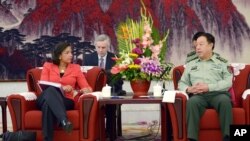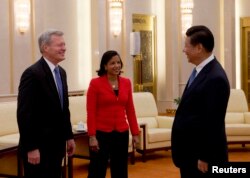U.S. National Security Adviser Susan Rice is calling for expanded military cooperation to help reduce tensions between the United States and China.
"The military-to-military ties between the United States and China have grown and strengthened in recent years and it is an area of cooperation that the United States values," Rice said Tuesday while in Beijing to meet with top Chinese officials.
Her three-day visit comes after last month’s dangerous altercation between a U.S. military aircraft and a Chinese fighter jet over the South China Sea.
The Pentagon accused the Chinese pilot of acting unprofessionally and aggressively by making several threatening passes of the American surveillance aircraft, coming within nine meters of the plane.
China denied the accusations, saying the jet kept a safe distance. It said the problem was caused by the presence of the U.S. plane, which was in international airspace about 200 kilometers east of China's southern island of Hainan.
As China grows militarily, it has become increasingly unhappy with the presence of U.S. military jets near its airspace. Following the incident, Beijing warned it would continue responding to U.S. surveillance flights in the area.
Sensitive discussions
The incident is one of many sensitive topics addressed Tuesday during Rice's visit, which included a meeting with Chinese President Xi Jinping.
Rice told Xi that U.S. President Barack Obama, scheduled to meet with Xi in China in November, places a high priority on maintaining good relations with Beijing.
"President Obama firmly believes that the U.S.-China relationship is one of the most consequential bilateral relationships in the world and that there is virtually no problem of global significance that can be better resolved when the United States and China are working together at the same table," Rice said.
In his public comments, Xi also touted what Beijing officials have referred to as a "new model" of relations between major powers.
"We stand ready to build a new major model for our country's relationship with the U.S.," he said, "and to build a non-confrontational and non-conflict bilateral relationship based on mutual respect."
Nations ‘face challenges’
During earlier meetings with senior Chinese officials, Rice acknowledged Washington and Beijing "face challenges," but she said they should work to avoid military incidents that "could complicate the relationship."
Over the past year, China has displayed increasing willingness to assert its claims over territory in the East and South China Seas. Authorities temporarily sent a mobile drilling platform to waters contested by Vietnam; Chinese workers are carrying out land reclamation efforts on reefs claimed by the Philippines; and Beijing has established a new Air Defense Identification Zone that overlaps with ones created by Japan and South Korea.
Those actions have raised tensions with China’s neighbors and with Washington.
But Rice's trip is also focused on areas of potential cooperation. Before meeting Tuesday with China’s foreign minister, Wang Yi, Rice said she planned to discuss North Korea, Iran, Afghanistan, and Islamic State fighters in Syria and Iraq.
Laying groundwork
Rice’s trip, which ends Wednesday, is aimed at laying the groundwork for Obama’s upcoming visit to China during the Asia Pacific Economic Cooperation summit.
China will host the APEC summit November 10 and 11 in Beijing. The heads of government of 21 member countries will attend. Obama plans to stay on for a bilateral meeting with Xi.
"It’s very important to maintain stable military-to-military relations, at least before the summit between Obama and Xi Jinping," said Xiaohe Cheng, an international relations professor at Beijing's Renmin University of China. "The two countries have already reached important consensus to prevent such accidents."
But there is still much work to be done.
"The relationship between the two countries is, frankly speaking, in bad shape,” the professor said. “Officials and scholars finger point and name call. The situation in the South China Seas and East China Seas make the relationship much worse.
"It’s very important for the two countries to stabilize the relationship."
Some information for this report was provided by Reuters.






